
| C++语法 | 相关知识点 | 可以通过点击 | 以下链接进行学习 | 一起加油! |
|---|---|---|---|---|
| 命名空间 | 缺省参数与函数重载 | C++相关特性 | 类和对象-上篇 | 类和对象-中篇 |
| 类和对象-下篇 | 日期类 | C/C++内存管理 | 模板初阶 | String使用 |
| String模拟实现 | Vector使用及其模拟实现 | List使用及其模拟实现 | 容器适配器Stack与Queue | Priority Queue与仿函数 |
| 模板进阶-模板特化 | 面向对象三大特性-继承机制 | 面向对象三大特性-多态机制 | STL 树形结构容器 | 二叉搜索树 |
| AVL树 | 红黑树 | 红黑树封装map/set | 哈希-开篇 | 闭散列-模拟实现哈希 |
| 哈希桶-模拟实现哈希 |
本篇将讲述如何通过哈希表封装 unordered_map 和 unordered_set 容器。在开始本章内容之前,建议先阅读红黑树封装 map 和 set一文,以便更好地理解编译器如何区分 unordered_map 和 unordered_set 并调用底层哈希表。


?个人主页:是店小二呀
?C语言专栏:C语言
?C++专栏: C++
?初阶数据结构专栏: 初阶数据结构
?高阶数据结构专栏: 高阶数据结构
?Linux专栏: Linux
?喜欢的诗句:无人扶我青云志 我自踏雪至山巅 
文章目录
一、节点类型二、区分unordered_map/set容器三、相关文件修改后3.1 HashTable.h3.2 unoderded_set.h3.3 unoderded_map.h 四、实现迭代器4.1 迭代器常见功能4.2 operator++实现4.3 编译器扫描顺序问题4.3.1 【第一个办法】:声明及其友元4.3.2 【第二办法】:内部类 4.4 operator++内部逻辑4.5 获得begin和end迭代器位置4.6 迭代器调用流程图 五、unoderded_map/set相关接口实现5.1 unoderded_map相关接口5.2 unoderded_set相关接口5.3 HashTable相关接口调整 HashTable.h
这里哈希表将采用哈希桶的方式解决哈希冲突且实现哈希表结构,那么我们需要对哈希表节点类型进行处理,同时设计编译器去识别unordered_map/set的逻辑。
一、节点类型
如果我们想使用哈希表封装unordered_map/set容器,就需要考虑泛型编程,将节点类型统一成T类型
template<class T> struct HashNode { T _data; HashNode<T>* _next; HashNode(const T& data) :_data(data) ,_next(nullptr) {} };二、区分unordered_map/set容器
编译器是无非确定你需要啥容器**,这里我们可以通过外部输入数据,使得编译器明确你需要啥容器,该容器都有一套属于返回K类型的仿函数**,只要unordered_set是否会多余,这里可以参考红黑树封装map/set文章,这里是为了跟map构成模板,陪太子读书。
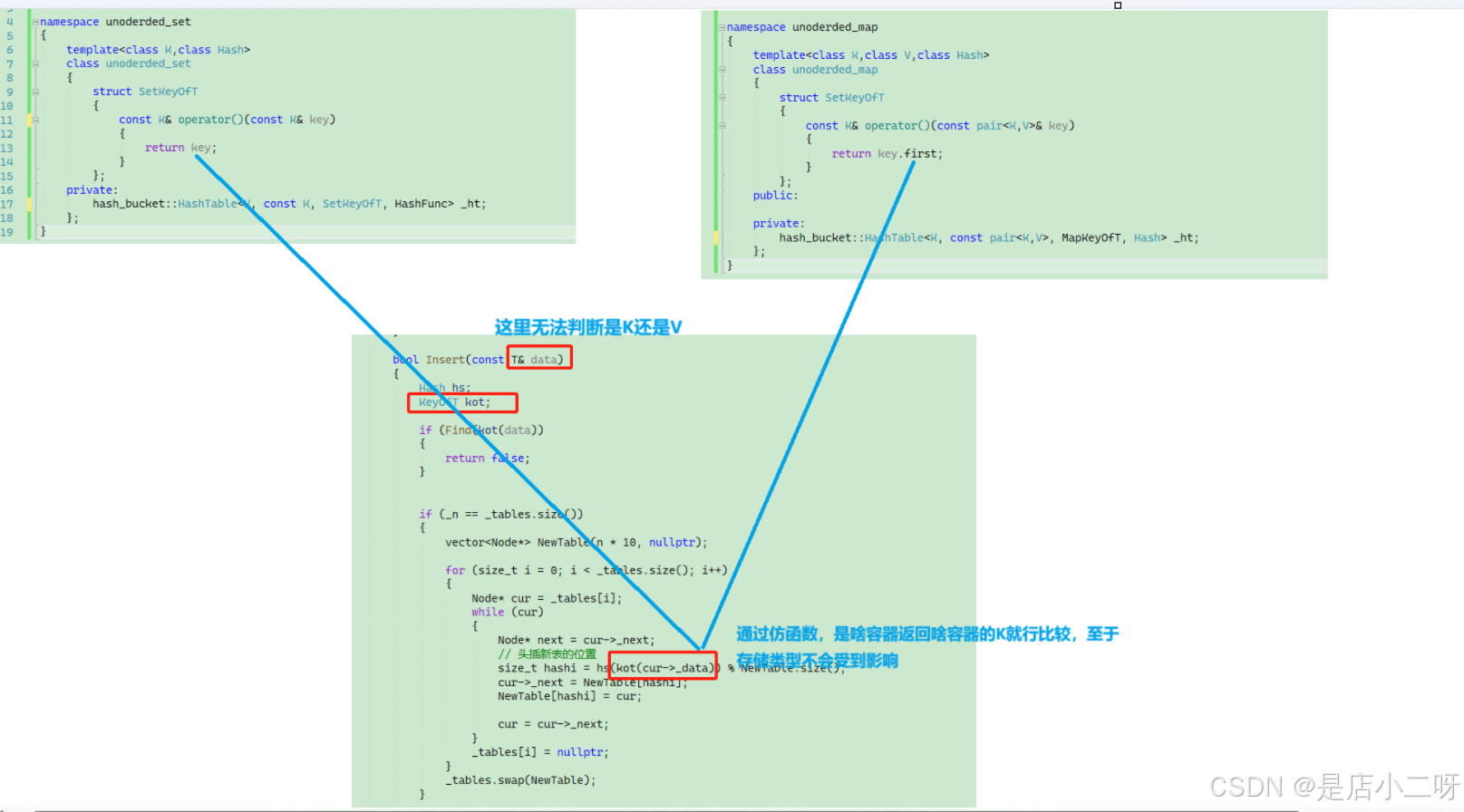
既然我们希望可以通过手动输入数据,得到预计效果,那么关于HashFunc函数也是期望从外部调用,这里可以写到外面来。(图片写错了,这里看下面的)
template<class K,class Hash = HashFunc > and template<class K,class T,class Hash = HashFunc>
三、相关文件修改后
3.1 HashTable.h
#pragma once#include <iostream>using namespace std;#include <string>#include <vector>template<class K> struct HashFunc { size_t operator()(const K& key) { return (size_t)key; } };template<>struct HashFunc<string>{ size_t operator()(const string& key) { size_t hash = 0; for (auto ch : key) { hash *= 131; hash += ch; } return hash; }};namespace hash_bucket{ template<class T> struct HashNode { T _data; HashNode<T>* _next; HashNode(const T& data) :_data(data) ,_next(nullptr) {} }; template<class K, class T, class KeyOfT, class Hash> class HashTable { public: typedef HashNode<T> Node; HashTable() { _tables.resize(10, nullptr); } ~HashTable() { for (size_t i = 0; i < _tables.size(); i++) { Node* cur = _tables[i]; while (cur) { Node* next = cur->_next; delete cur; cur = next; } } } bool Insert(const T& data) { Hash hs; KeyOfT kot; if (Find(kot(data)) { return false; } if (_n == _tables.size()) { vector<Node*> NewTable(n * 10, nullptr); for (size_t i = 0; i < _tables.size(); i++) { Node* cur = _tables[i]; while (cur) { Node* next = cur->_next; // 头插新表的位置 size_t hashi = hs(kot(cur->_data)) % NewTable.size(); cur->_next = NewTable[hashi]; NewTable[hashi] = cur; cur = cur->_next; } _tables[i] = nullptr; } _tables.swap(NewTable); } size_t hashi = hs(kot(data)) % _tables.size(); //进行头插操作 Node* newnode = new Node(data); _tables[hashi]->_next = newnode; _tables[hashi] = newnode; ++_n; return true; } Node* Find(const K& key) { Hash hs; KeyOfT kot; size_t hashi = hs(key) % _tables.size(); Node* cur = _tables[hashi]; while (cur) { if (kot(cur->_data) == key) { return &kot(cur->_data); } else { cur = cur->_next; } } return nullptr; } bool Erase(const K& key) { Hash hs; size_t hashi = hs(key) % _tables.size(); Node* cur = _tables[hashi]; Node* prev = nullptr; while (cur) { if (kot(cur->_data) == key) { if (prev == nullptr) { _tables[hashi] = cur->_next; } else { prev->_next = cur->_next; } delete cur; return true; } else { prev = cur; cur = cur->_next; } } return false; } private: vector<Node*> _tables; size_t _n = 0; }; }这里关于HashFunc()需要放在哈希命名空间外部,因为在其他头文件需要使用到该HashFunc()
3.2 unoderded_set.h
namespace unoderded_set{ template<class K,class Hash = HashFunc<K>> class unoderded_set { struct SetKeyOfT { const K& operator()(const K& key) { return key; } }; private: hash_bucket::HashTable<K, const K, SetKeyOfT, Hash> _ht; };}3.3 unoderded_map.h
namespace unoderded_map{ template<class K,class V,class Hash = HashFunc<K>> class unoderded_map { struct SetKeyOfT { const K& operator()(const pair<K,V>& key) { return key.first; } }; public: private: hash_bucket::HashTable<K, const pair<K,V>, MapKeyOfT, Hash> _ht; };}四、实现迭代器
实现哈希表中迭代器跟之前其他容器实现迭代器需要考虑的差不多,主要是对于operator++和operator–需要考虑不同容器的结构进行行为重定义。同时需要设计为模板template<class T,class Ptr, class Ref>去匹配const类型和非const类型调用同一个迭代器。
typedef __HTIterator<T*, T&> iterator;typedef __HTIterator<const T*, const T&> const_iterator;这里得到当前_node的位置,是浅拷贝。这不希望改变实参,而是希望通过该实参位置进行操作,得到预期数据,在下一次进行操作时还是之前位置。
4.1 迭代器常见功能
template<class T,class Ptr, class Ref> struct _HTIterator { //得到一个节点 typedef HashNode<T>Node; typedef _HTIterator Self; Node* _node; //这里希望是浅拷贝 _HTIterator(const Node* node) :_node(node) {} Ptr operator->() { return &_node->_data; } Ref operator*() { return _node->_data; } bool operator!=(const Self& s) { return _node != s._node; } };4.2 operator++实现
【大体思路】:在第一个不为空位置,向下遍历++直到_node-> _next ==nullptr说明该位置迭代器达到悬挂着哈希桶最后一个不为空的桶,那么需要通过当前节点数值,进行除留余数法得到当前表位置下标,以该下标为基准重新在表中找到下一个不为空的位置,直到i == tables.size()说明遍历完成。
4.3 编译器扫描顺序问题
目前关于迭代器实现某方面功能需要借助HashTable类的类型及其成员,但是问题在于HashTable需要将迭代器设为"武器",将迭代器类功能具体实现放在HashTabl类上方,编译器扫描是上到下扫描,这就导致了这两个类总有一方无法得到另外一份的东西。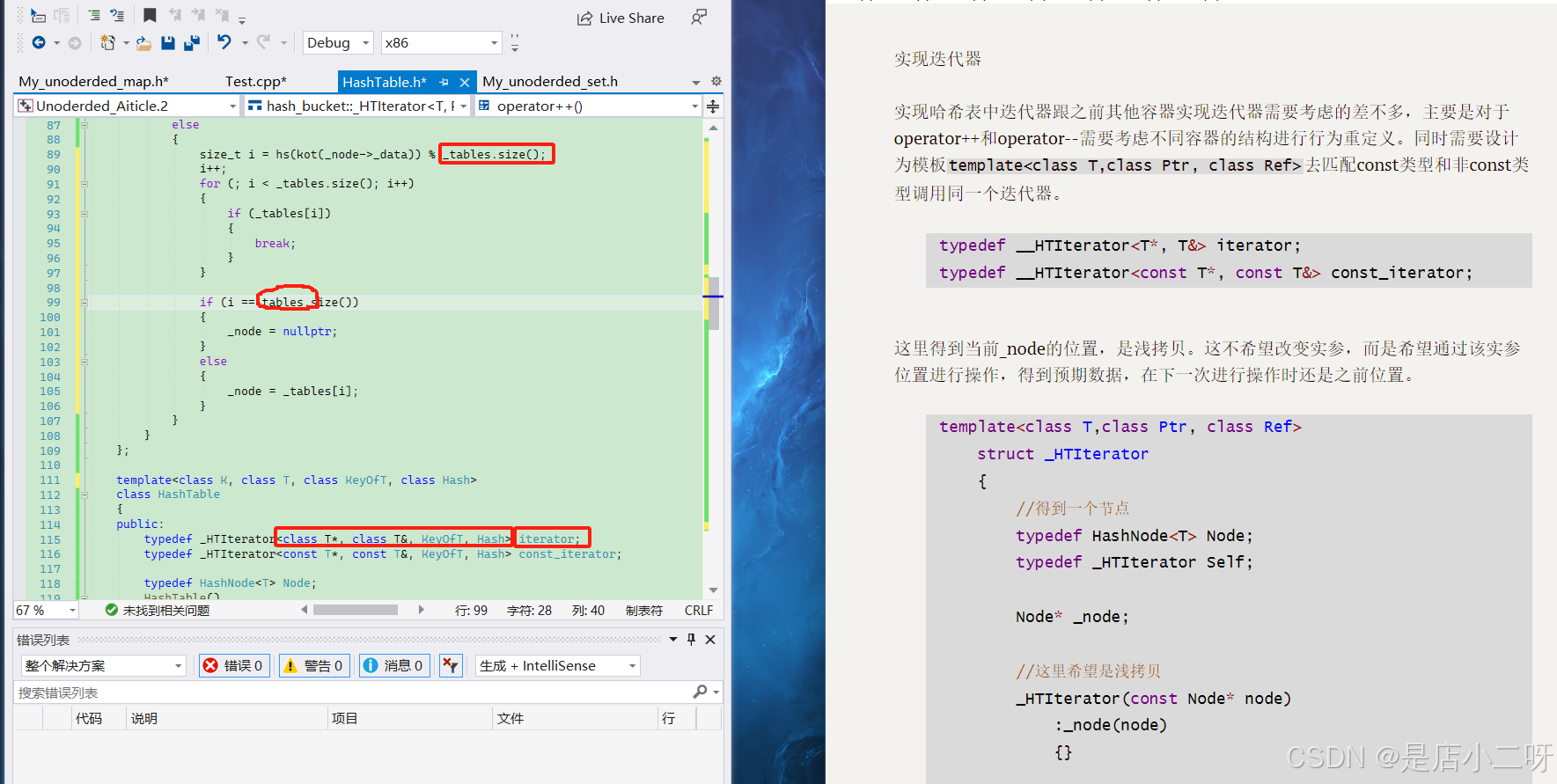
4.3.1 【第一个办法】:声明及其友元
我们可以在迭代器类中声明HashTable类作为类型定义一个哈希表指针,同时在HashTable类型设置迭代器友元,使之迭代器可以通过定义的哈希表指针访问到哈希表。
template<class K,class T,class Ptr, class Ref,class KeyOfT, class Hash> struct _HTIterator {//前置声明 template<class K, class T, class KeyOfT, class Hash> class HashTable; }template<class K, class T, class KeyOfT, class Hash> class HashTable { public: template<class K, class T, class Ptr, class Ref, class KeyOfT, class Hash> friend struct _HTIterator; }【前置声明】
前置声明仅仅告诉编译器有一个 HashTable 类,但由于没有给出该类的完整定义和实现,编译器并不知道如何去使用它。也就是说,你不能在代码中使用 HashTable 类的功能,比如创建对象、调用其成员函数、访问数据成员等,除非你提供了类的完整定义。
4.3.2 【第二办法】:内部类
template<class K, class T, class KeyOfT, class Hash>class HashTable{typedef HashNode<T> Node;public:// 友元声明/*template<class K, class T, class KeyOfT, class Hash>friend struct __HTIterator;*/// 内部类template<class Ptr, class Ref>struct __HTIterator{typedef HashNode<T> Node;typedef __HTIterator Self; } }这里就采用第一种方法(选择哪个方法都是差不多的)
4.4 operator++内部逻辑
Self& operator++(){ KeyOfT kot; Hash hs; if( _node->_next ) { _node = _node->_next; } else { //访问该成员 size_t i = hs(kot(_node->_data)) % _pht->_tables.size(); i++; for (; i < _pht->_tables.size(); i++) { if (_pht->_tables[i]) { break; } } if (i == _pht->tables.size()) { _node = nullptr; } else { _node = _pht->_tables[i]; } }}由于在库中unoderded_map和unoderded_set只有单向迭代器,就没有operator–。如果有兴趣可以将单链表设计为双向链表,然后根据operator++逻辑,设计出一个operator–接口
4.5 获得begin和end迭代器位置
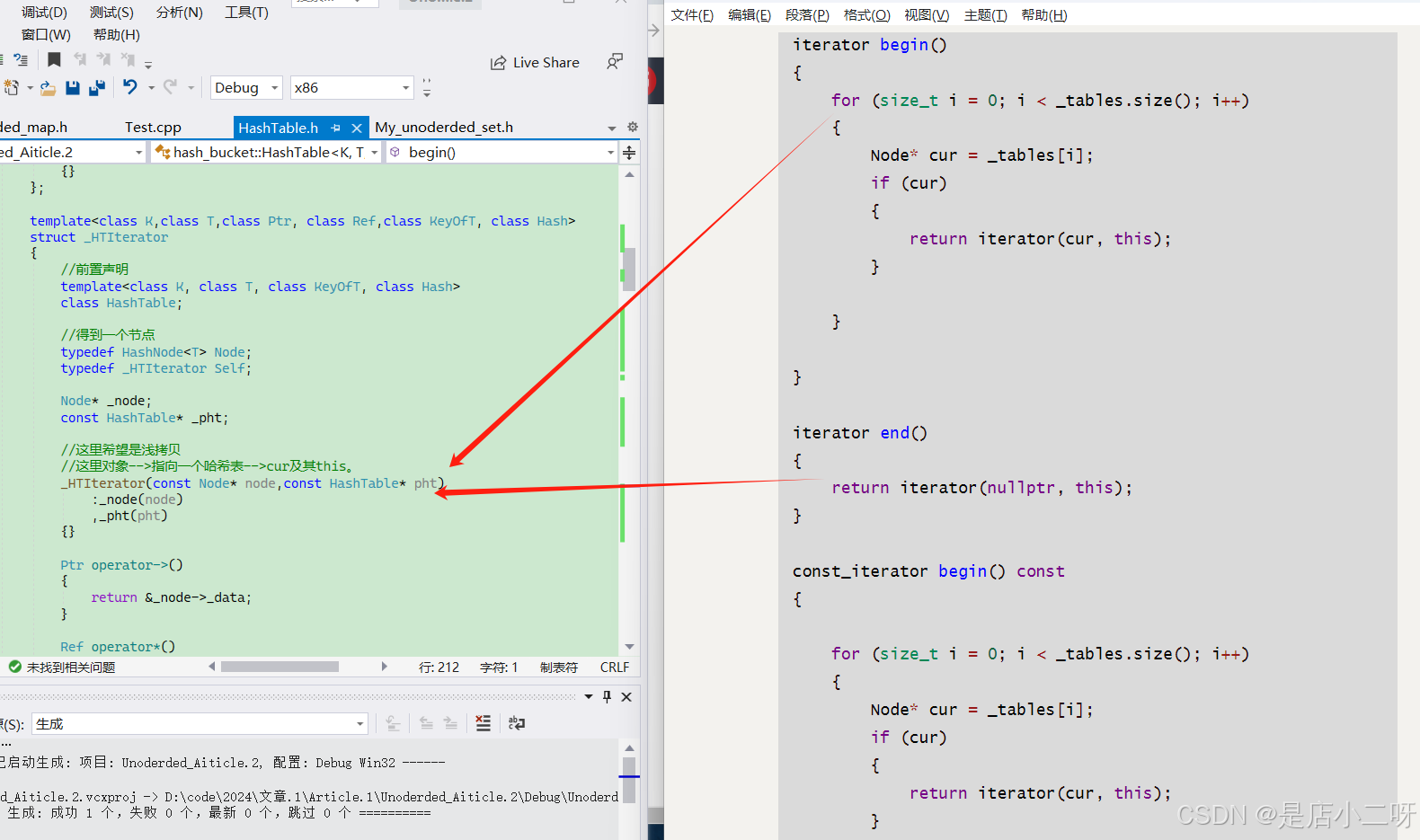
iterator begin(){ for (size_t i = 0; i < _tables.size(); i++) { Node* cur = _tables[i]; if (cur) { return iterator(cur, this); } }}iterator end(){ return iterator(nullptr, this);}const_iterator begin() const{ for (size_t i = 0; i < _tables.size(); i++) { Node* cur = _tables[i]; if (cur) { return iterator(cur, this); } }}const_iterator end() const{ return iterator(nullptr, this);}这里就是通过哈希表begin和end接口,构造相关需求的迭代器。这里很好体现了每个不同对象的迭代器指向表是自己对象的哈希表。
4.6 迭代器调用流程图
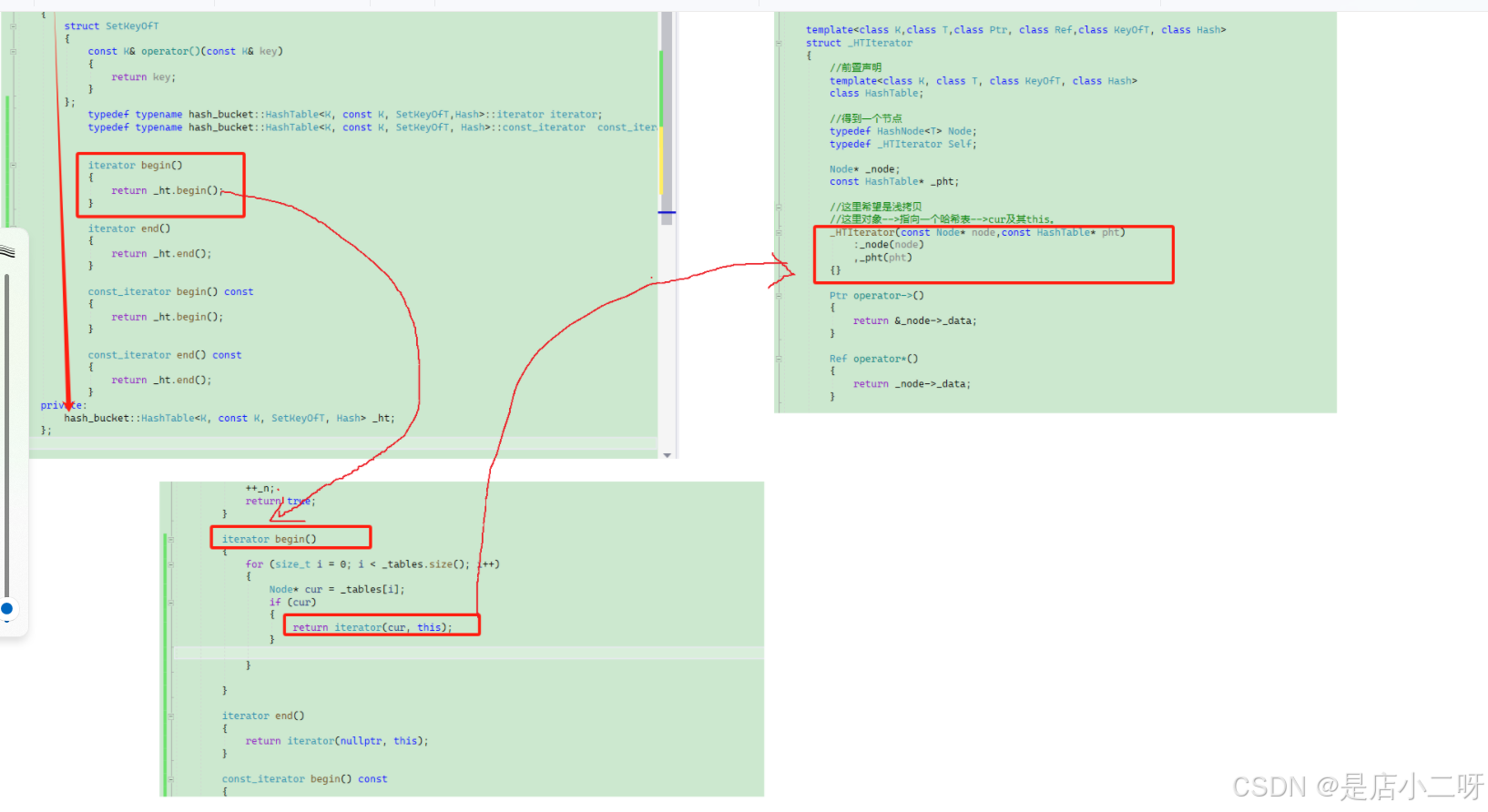
unoderded_map及其unoderded_set迭代器配置,由于unoderded_map支持修改元素,那么没有必要写const系列。
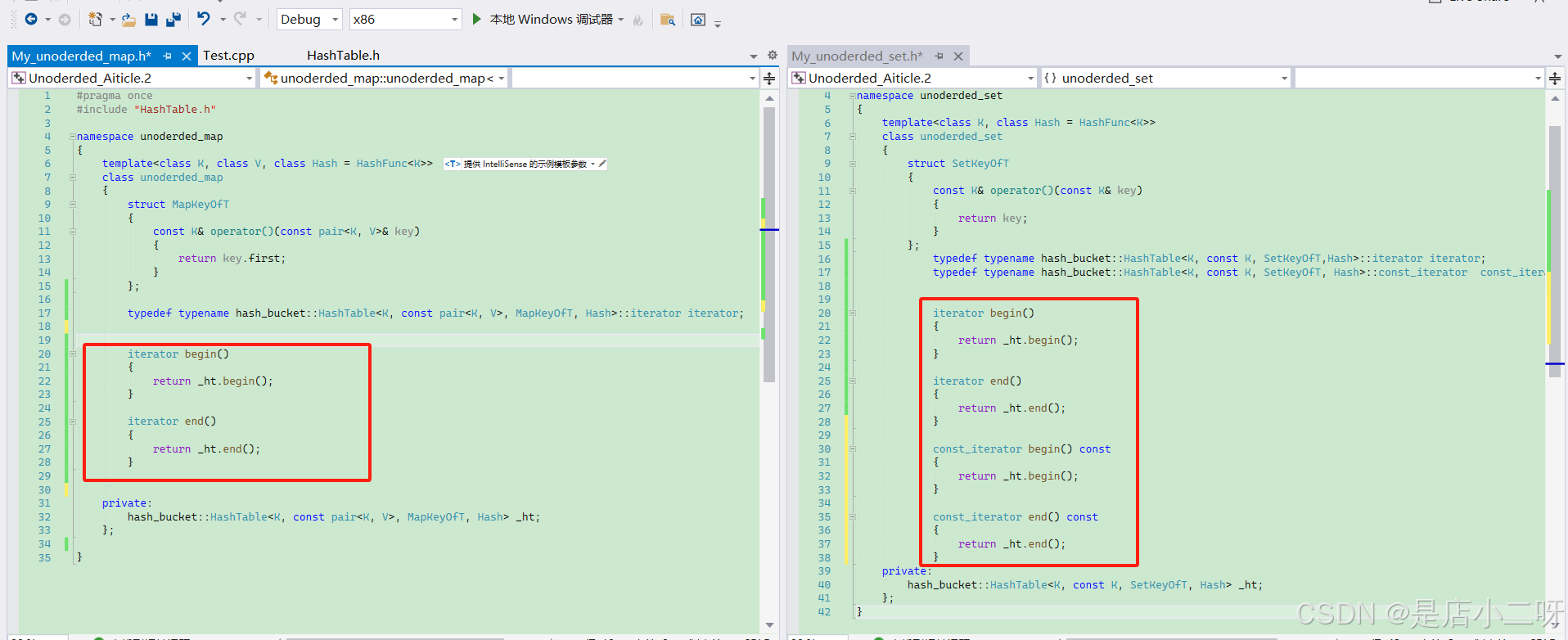
五、unoderded_map/set相关接口实现
5.1 unoderded_map相关接口
namespace unoderded_map{ template<class K, class V, class Hash = HashFunc<K>> class unoderded_map { struct MapKeyOfT { const K& operator()(const pair<K, V>& key) { return key.first; } }; typedef typename hash_bucket::HashTable<K, const pair<K, V>, MapKeyOfT, Hash>::iterator iterator; iterator begin() { return _ht.begin(); } iterator end() { return _ht.end(); } V& operator[](const K& key) { pair<iterator, bool> ret = insert(make_pair(key, V())); return ret.first->second; } pair<iterator, bool> insert(const pair<K, V>& kv) { return _ht.Insert(kv); } private: hash_bucket::HashTable<K, const pair<K, V>, MapKeyOfT, Hash> _ht; };}【unoderded_map增添接口】:V& operator[](const K& key)和pair<iterator, bool> insert(const pair<K, V>& kv)
5.2 unoderded_set相关接口
#pragma once#include "HashTable.h"namespace unoderded_set{ template<class K, class Hash = HashFunc<K>> class unoderded_set { struct SetKeyOfT { const K& operator()(const K& key) { return key; } }; typedef typename hash_bucket::HashTable<K, const K, SetKeyOfT,Hash>::iterator iterator; typedef typename hash_bucket::HashTable<K, const K, SetKeyOfT, Hash>::const_iterator const_iterator; iterator begin() { return _ht.begin(); } iterator end() { return _ht.end(); } const_iterator begin() const { return _ht.begin(); } const_iterator end() const { return _ht.end(); } pair<iterator, bool> insert(const K& key) { return _ht.Insert(key); } iterator find(const K& key) { return _ht.Find(key); } bool erase(const K& key) { return _ht.Erase(key); } private: hash_bucket::HashTable<K, const K, SetKeyOfT, Hash> _ht; };}【unoderded_set增添接口】 pair<iterator, bool> insert(const K& key)和 iterator find(const K& key)及其bool erase(const K& key)
5.3 HashTable相关接口调整
iterator Find(const K& key){ Hash hs; KeyOfT kot; size_t hashi = hs(key) % _tables.size(); Node* cur = _tables[hashi]; while (cur) { if (kot(cur->_data) == key) { return iterator(cur, this); } else { cur = cur->_next; } } return end();}pair<iterator, bool> Insert(const T& data){ Hash hs; KeyOfT kot; iterator it = Find(kot(data)); if (it != end()) return make_pair(it, false); if (_n == _tables.size()) { vector<Node*> NewTable(_n * 10, nullptr); for (size_t i = 0; i < _tables.size(); i++) { Node* cur = _tables[i]; while (cur) { Node* next = cur->_next; // 头插新表的位置 size_t hashi = hs(kot(cur->_data)) % NewTable.size(); cur->_next = NewTable[hashi]; NewTable[hashi] = cur; cur = cur->_next; } _tables[i] = nullptr; } _tables.swap(NewTable); } size_t hashi = hs(kot(data)) % _tables.size(); //进行头插操作 Node* newnode = new Node(data); _tables[hashi]->_next = newnode; _tables[hashi] = newnode; ++_n; return make_pair(iterator(newnode, this), true);}unodered_map当中operator[]可以看作insert和find融合版本,不需要单独设计Find(),但是内部还是有调用Find()逻辑
HashTable.h
#pragma once#include <iostream>using namespace std;#include <string>#include <vector>template<class K> struct HashFunc { size_t operator()(const K& key) { return (size_t)key; } };template<>struct HashFunc<string>{ size_t operator()(const string& key) { size_t hash = 0; for (auto ch : key) { hash *= 131; hash += ch; } return hash; }};namespace hash_bucket{ template<class T> struct HashNode { T _data; HashNode<T>* _next; HashNode(const T& data) :_data(data) , _next(nullptr) {} }; template<class K,class T,class Ptr, class Ref,class KeyOfT, class Hash> struct _HTIterator { //前置声明 template<class K, class T, class KeyOfT, class Hash> class HashTable; //得到一个节点 typedef HashNode<T>Node; typedef _HTIterator Self; Node* _node; const HashTable* _pht; //这里希望是浅拷贝 //这里对象-->指向一个哈希表-->cur及其this。 _HTIterator(const Node* node,const HashTable* pht) :_node(node) ,_pht(pht) {} Ptr operator->() { return &_node->_data; } Ref operator*() { return _node->_data; } bool operator!=(const Self& s) { return _node != s._node; } Self& operator++() { KeyOfT kot; Hash hs; if( _node->_next ) { _node = _node->_next; } else { //访问该成员 size_t i = hs(kot(_node->_data)) % _pht->_tables.size(); i++; for (; i < _pht->_tables.size(); i++) { if (_pht->_tables[i]) { break; } } if (i == _pht->tables.size()) { _node = nullptr; } else { _node = _pht->_tables[i]; } } } }; template<class K, class T, class KeyOfT, class Hash> class HashTable { public: template<class K, class T, class Ptr, class Ref, class KeyOfT, class Hash> friend struct _HTIterator; typedef _HTIterator< K, T, T*, T&, KeyOfT, Hash> iterator; typedef _HTIterator<K, T,const T*, const T&, KeyOfT, Hash> const_iterator; typedef HashNode<T> Node; HashTable() { _tables.resize(10, nullptr); } ~HashTable() { for (size_t i = 0; i < _tables.size(); i++) { Node* cur = _tables[i]; while (cur) { Node* next = cur->_next; delete cur; cur = next; } } } iterator Find(const K& key) { Hash hs; KeyOfT kot; size_t hashi = hs(key) % _tables.size(); Node* cur = _tables[hashi]; while (cur) { if (kot(cur->_data) == key) { return iterator(cur, this); } else { cur = cur->_next; } } return end(); } pair<iterator, bool> Insert(const T& data) { Hash hs; KeyOfT kot; iterator it = Find(kot(data)); if (it != end()) return make_pair(it, false); if (_n == _tables.size()) { vector<Node*> NewTable(_n * 10, nullptr); for (size_t i = 0; i < _tables.size(); i++) { Node* cur = _tables[i]; while (cur) { Node* next = cur->_next; // 头插新表的位置 size_t hashi = hs(kot(cur->_data)) % NewTable.size(); cur->_next = NewTable[hashi]; NewTable[hashi] = cur; cur = cur->_next; } _tables[i] = nullptr; } _tables.swap(NewTable); } size_t hashi = hs(kot(data)) % _tables.size(); //进行头插操作 Node* newnode = new Node(data); _tables[hashi]->_next = newnode; _tables[hashi] = newnode; ++_n; return make_pair(iterator(newnode, this), true); } iterator begin() { for (size_t i = 0; i < _tables.size(); i++) { Node* cur = _tables[i]; if (cur) { return iterator(cur, this); } } } iterator end() { return iterator(nullptr, this); } const_iterator begin() const { for (size_t i = 0; i < _tables.size(); i++) { Node* cur = _tables[i]; if (cur) { return iterator(cur, this); } } } const_iterator end() const { return iterator(nullptr, this); } bool Erase(const K& key) { Hash hs; size_t hashi = hs(key) % _tables.size(); Node* cur = _tables[hashi]; Node* prev = nullptr; while (cur) { if (kot(cur->_data) == key) { if (prev == nullptr) { _tables[hashi] = cur->_next; } else { prev->_next = cur->_next; } delete cur; return true; } else { prev = cur; cur = cur->_next; } } return false; } private: vector<Node*> _tables; size_t _n = 0; };};
以上就是本篇文章的所有内容,在此感谢大家的观看!这里是店小二呀C++笔记,希望对你在学习C++语言旅途中有所帮助!